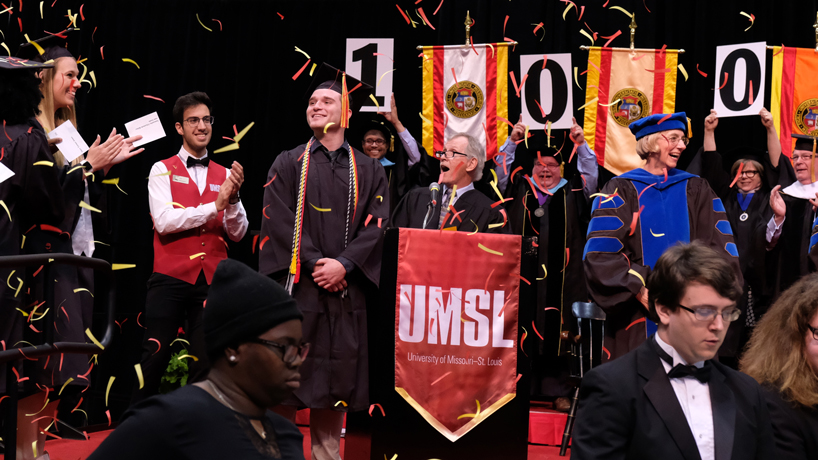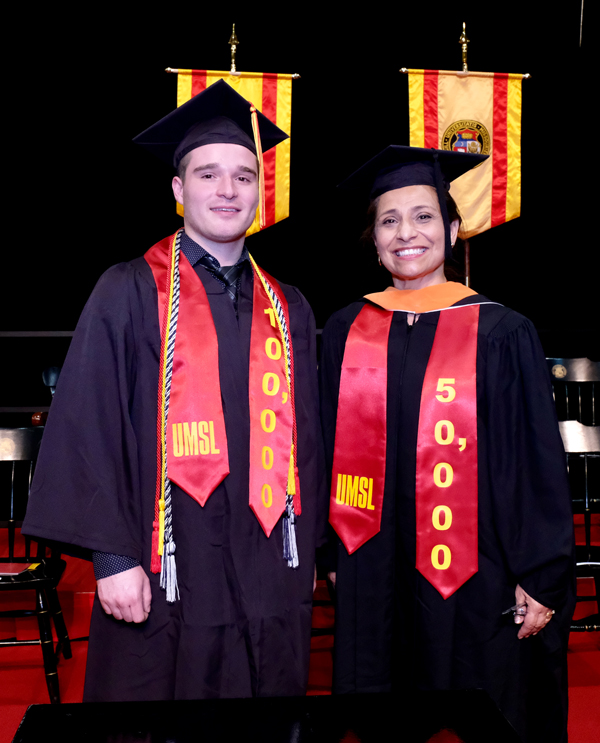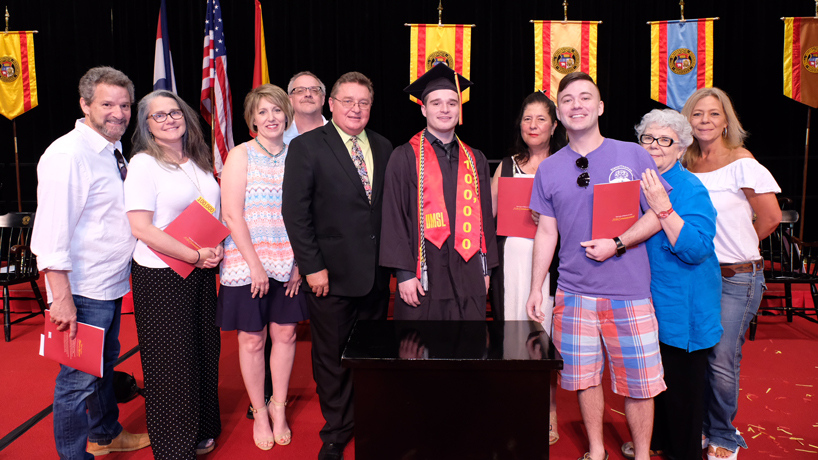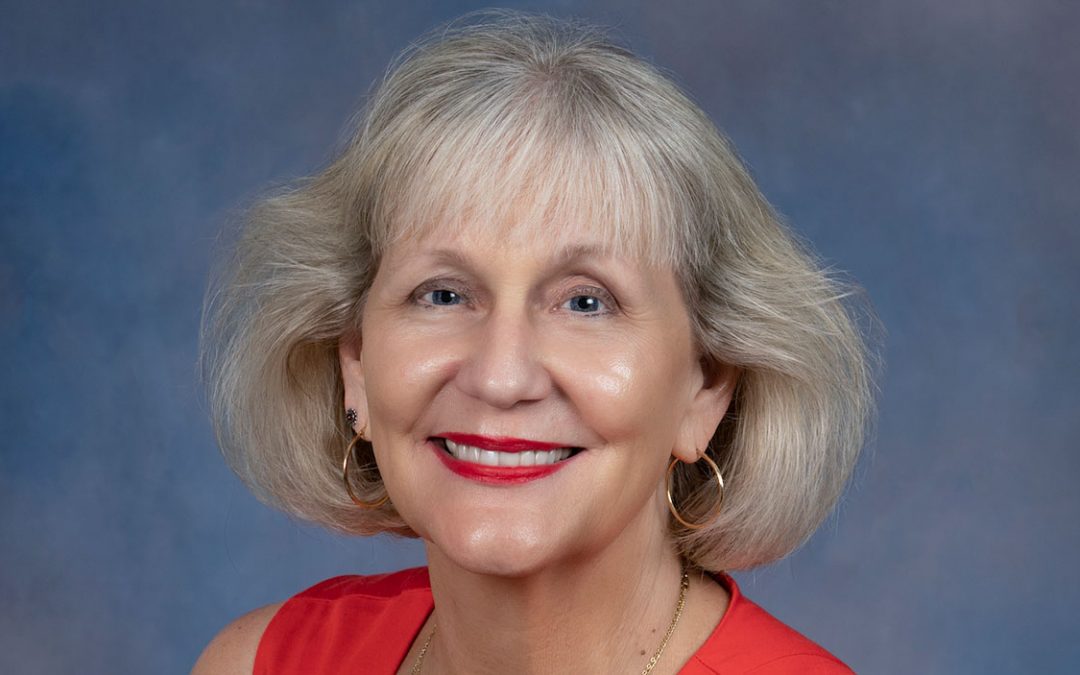
Marco Pipoly (left of lectern) is showered in confetti after being announced as the 100,000th graduate of the University of Missouri–St. Louis during a commencement ceremony for the College of Arts and Sciences Saturday at the Mark Twain Athletic Center. Pipoly has received a research fellowship from the National Science Foundation and is enrolling in the Neuroscience PhD Program at the University of Iowa. (Photos by August Jennewein)
Marco Pipoly came to the University of Missouri–St. Louis already certain of what he wanted to do next: pursue a PhD.
The steps he’s taken since his arrival – from his coursework and extensive undergraduate research in psychology to his involvement in a neuroscience pipeline program sponsored by the National Institutes of Health – have all been directed toward that end.
“Everything I’ve done has been really checkmarks,” Pipoly said. “I’m doing exactly what I’m supposed to be doing, which has been great for me.”
His efforts have paid off in admission into the Interdisciplinary Graduate Program in Neuroscience at the University of Iowa and a fellowship from the National Science Foundation.
But the future-focused Pipoly found himself stopped in his tracks Saturday afternoon as confetti rained down around him while walking across the stage at the Mark Twain Athletic Center during a commencement ceremony for the College of Arts and Sciences.
When he accepted the diploma for his BS in psychology, he became the 100,000th graduate of UMSL since its founding in 1963. Alicia Friedrichs, UMSL’s 50,000th graduate, from the class of 1997, presented him with a special stole, and Chancellor Tom George and Provost and Executive Vice Chancellor for Academic Affairs Kristin Sobolik congratulated him.

Marco Pipoly (at left), who became UMSL’s 100,000th graduate on Sunday, stands with Alicia Friedrichs, UMSL’s 50,000th graduate and a member of the class of 1997.
Pipoly, a student in the Pierre Laclede Honors College, has much in common with the legions of alumni who have walked before him at an institution that from the beginning has made its mission to provide an opportunity for everyone to receive a quality and affordable education.
A graduate of the Parkway School District, Pipoly transferred to UMSL from St. Louis Community College–Meramec and has spent years juggling school with work responsibilities, at several points holding two jobs during his time in junior college.
Pipoly’s path toward a PhD began even before Meramec, during a year he spent volunteering at Project Ark, an organization specifically dedicated to providing support for those in the St. Louis Region infected, affected and at risk of HIV.
“It was there that I began to learn a lot about what kind of things are plaguing those in the LGBT community and ethnic minorities who turn to drugs, and I started to learn that HIV, for example, has cognitive impacts,” Pipoly said. “I didn’t know about that before. The virus gets into the brain and starts doing all kinds of weird things.”
That piqued his interest in cognition, and it stayed with him a year later when he was enrolled in his Intro to Psychology course at Meramec. His professor spent days detailing different subfields of psychology, including a look at how psychology merges with neuroscience.
“It was that day, as we did a broad overview, that I got really excited about it,” Pipoly said. “I knew it was a career path that I could take.”
He looked at a variety of schools when weighing where to continue his studies after completing his associate degree and got accepted as a transfer student to some of the nation’s premier public universities, including the University of Illinois Urbana-Champaign, University of North Carolina–Chapel Hill and the University of Wisconsin–Madison. But several professors at Meramec suggested he think long and hard about UMSL.
“When I came and I visited, I was really impressed with how organized the presentation was, how warm and friendly people were, how they had things mapped out for where I wanted to go,” Pipoly said.
He saw good research opportunities as an undergraduate, and UMSL’s relative affordability helped cinch the decision.
Assistant Professor Carissa Philippi was the first to encourage him to work with her in the Laboratory of Cognitive & Affective Neurobiology of Self. She’d had him as a student in her biological psychology and clinical neuropsychology classes.
“He stood out because he asked lots of questions,” Philippi said. “He was really curious, and he also really seemed to have a good breadth of knowledge. He’d been to talks at other universities and read articles in his spare time, and it was clear from his questions that he wasn’t just asking for clarification about the textbook but really wanted to understand the implications of things we were studying or how they applied to other things he’d learned.”
Philippi was leading a study on mind-wandering in children, and Pipoly had the unglamorous job of helping recruit subjects to participate. She was impressed at how hard he worked at it, visiting different libraries across the area to find potential participants.
Pipoly later had an opportunity to work with Associate Professor David Tate at UMSL’s Missouri Institute of Mental Health. Tate researches brain injuries with data from a military population, and Pipoly’s work with Tate exposed him to diffusion-weighted MRI – something that stood out on his graduate school application.

Marco Pipoly (center) celebrates becoming the 100,000th graduate of the University of Missouri–St. Louis with family and friends Saturday after a commencement ceremony for the College of Arts and Sciences.
Faculty members alerted him to the NIH Blueprint initiative “Enhancing Neuroscience Diversity through Undergraduate Research Education Experiences,” or simply ENDURE. The national program aims to raise interest and opportunities in neuroscience research for individuals who are typically underrepresented in the field. Washington University in St. Louis serves as the local site – one of six nationally – with UMSL and Harris-Stowe State University as partners.
Participants in the program gain further research experience and academic and professional development outside the lab. They receive $5,000 stipends for up to two summers, present their research findings at the annual Society for Neuroscience meeting and get help navigating the graduate school admissions process.
Pipoly has worked under Deanna Barch, the chair of the Department of Psychological & Brain Sciences at Washington University, in the Cognitive Control & Psychopathology Laboratory. He’s used a population of healthy adults from the Human Connectome Project and examined how individual variation in brain structure predicts impulsive measures on a delay discounting task.
More recently, he’s conducted similar research under Barch’s supervision with a population of 9- and 10-year-olds from the Adolescent Brain Cognitive Development Study and expanded it to include different indexes of impulsivity. He gave an oral presentation about his work last month at UMSL’s Undergraduate Research Symposium.
His experiences bolstered his case for an NSF fellowship, but he was still taken by surprise when he found out he won – and will receive $34,000 a year during his graduate coursework.
“It’s really competitive to get those NSF fellowships, and I think definitely him being in the neuroscience pipeline program contributed a lot to that,” Philippi said. “The experiences that he had really sort of helped prepare him for that but also he worked really, really hard on it and went through lots of revisions.”
Pipoly will begin graduate school at Iowa on June 1 and has already started plotting research possibilities.
“A lot of faculty have been very interested in bridging what I’ve been doing now into the work they’ve been doing there,” Pipoly said. “So, for example, looking at impulsivity in brain injury groups, which will be really interesting. I’ve been in lots of talks, and that’s what we’ve been discussing.”
But he’s not yet sure where his graduate school experience will lead him.
He remains grateful UMSL helped him get to this point.
“I’m very happy that, coming here, folks have consistently been as welcoming and as aware of my needs as they seemed when I first arrived,” Pipoly said. “I don’t know if that would have happened anywhere else. I think that I’ve been well-prepared for the transition to graduate school.”
Media Coverage
St. Louis Post-Dispatch
St. Louis Post-Dispatch (video)














